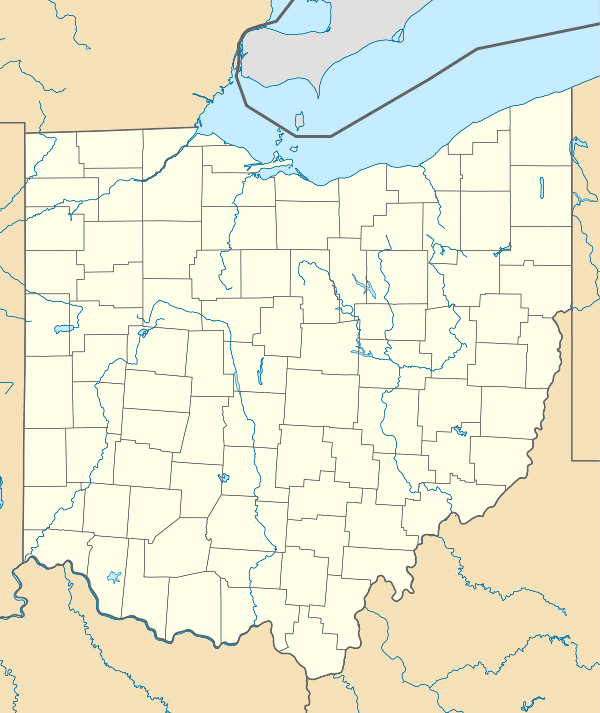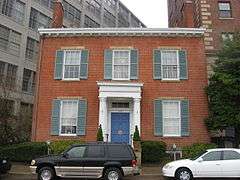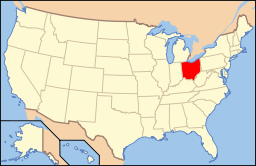Lytle Park Historic District
|
Lytle Park Historic District | |
|
Literary Club building | |
  | |
| Location | Roughly bounded by 3rd, 5th, Sycamore, Commercial Sq., and Butler Sts., Cincinnati, Ohio |
|---|---|
| Coordinates | 39°6′4″N 84°30′19″W / 39.10111°N 84.50528°WCoordinates: 39°6′4″N 84°30′19″W / 39.10111°N 84.50528°W |
| Area | 50 acres (20 ha) |
| Architectural style | Greek Revival, Italianate, Georgian |
| NRHP Reference # | 76001435[1] |
| Added to NRHP | March 26, 1976 |
Lytle Park Historic District is a historic district in Cincinnati, Ohio, United States. Roughly bounded by 3rd, 5th, Sycamore, Commercial Sq., and Butler Sts. in downtown Cincinnati, it centers on Lytle Park.
In 2014, Western & Southern Financial Group, owner of many properties within the Lytle Park Historic District asked the city to remove historic status of several historic buildings. The company hopes to demolish sections of the district in order to build new office space.[2][3]
Lytle Park
Lytle Park has a storied history and represents one of the oldest areas in the city.[4] Originally a hardwood forest, the park and its vicinity was the early site of Fort Washington, built in 1789 to protect early settlers of the Ohio River town from Indian attacks.[5]
The site next served as the homestead of the prominent Lytle family. Surveyor General of the Northwest Territory William Lytle II built his house there in 1809,[6] about ten years prior to the completion of the neighboring Martin Baum mansion (now the Taft Museum of Art).[7][8] The land then known as Lytle Square[9] was purchased[10] by the City of Cincinnati in 1905 and Lytle Park was dedicated July 6, 1907.[11]

The 11-foot (3.4 m) bronze statue of Abraham Lincoln facing the entrance of the park was commissioned by the Charles P. Taft family.[12] The unusually beardless[13] statue is the only public monument to an individual ever produced by sculptor George Grey Barnard.[14] The statue was dedicated amid great fanfare on March 31, 1917, by former president William Howard Taft.[15] The adjacent U.S. Marine Corps Memorial is a granite boulder with bronze plaque and Marine emblem atop a globe. It was dedicated in 1921.[16]
When an expressway was planned to be built downtown, Lytle Park faced its possible demise. Former Mayor Charles P. Taft went to Washington to fight for the right to restore buildings on top of the proposed tunnel and for the next six years groups of citizens from all over the city fought to preserve the area. In a non-competitive bid process, Western & Southern was eventually awarded the rights to develop an apartment building in exchange for a concrete slab to "cap" the portion of the new freeway trench running under the new structure, with public tax dollars used for the far bigger part under the park itself.[17][11][18] When the Lytle Tunnel was completed in 1970,[19] Lytle Park was the first park to be located above an interstate road.[20]
Described as an "urban oasis",[21][22][23] Lytle Park is known for its large seasonal flower beds of tulips and chrysanthemums in entirely urban surroundings.[24]
Properties contained within the historic district
In 1976, the buildings around the park were declared a historic district, and the resulting Lytle Park Historic District was listed on the National Register of Historic Places. The district includes examples of the Georgian, Greek Revival, and Italianate architectural styles,[1] as it was an elite residential district from the early days of Cincinnati's history kept free of surrounding industry.[25]
List
Source:[26]
- Baum-Taft House (Taft Museum)
- Literary Club of Cincinnati
- Anna Louise Inn (1909)
- Christ Church Cathedral
- Guilford School building (1914)
- Lytle Park
- Phelps building[27] (built 1926, now Residence Inn Cincinnati Downtown[28])
- Police Station No. 2[29]
- University Club of Cincinnati
- Western & Southern Financial Group building
References
- 1 2 National Park Service (2009-03-13). "National Register Information System". National Register of Historic Places. National Park Service.
- ↑ Yung, John (May 1, 2014). "Is Western & Southern planning a new HQ at Lytle Park?". Cincinnati Business Courier. Retrieved 7 June 2014.
- ↑ Demeropolis, Tom (May 2, 2014). "Western & Southern clears first step to reshape Lytle Park district". Cincinnati Business Courier. Retrieved 7 June 2014.
- ↑ "National Register Historic Districts". City of Cincinnati, Department of Planning and Buildings. Retrieved 15 December 2013.
- ↑ "Fort Washington". Ohio History Central. Retrieved 15 December 2013.
- ↑ "Lytle Tunnel to be overhauled". WLWT-TV. Aug 13, 2012. Retrieved 15 December 2013.
- ↑ "Taft Museum". Frommer's. Retrieved 15 December 2013.
- ↑ "Museum History". Taft Museum of Art. Retrieved 15 December 2013.
- ↑ "Lytle Park". u-s-history.com. Retrieved 15 December 2013.
- ↑ Annual Report, Board of Park Commissioners, City of Cincinnati. Roessler Bros. 1911. p. 39.
- 1 2 Other Parks part 2
- ↑ "Art & Architecture in the Parks". Cincinnati Park Board. Retrieved 15 December 2013.
- ↑ Federal Writers' Project (1943). Cincinnati, a Guide to the Queen City and Its Neighbors. p. 162.
- ↑ Morgan, Ann Lee (Jun 27, 2007). The Oxford Dictionary of American Art and Artists. Oxford University Press. p. 29.
- ↑ Allen, Lyman Whitney (1917). Dedication services : Barnard's Lincoln statue : presented to the city of Cincinnati by Mr. and Mrs. Charles P. Taft.
- ↑ "U. S. Marine Corps Memorial, (sculpture)". Smithsonian Institution. Retrieved 16 December 2013.
- ↑ name=Morford>Morford, Jana (Fall 1986). "Preserving a "Special Place:" The Lytle Park Neighborhood, 1948-1976". Queen City Heritage. 44 (3): 2–22.
- ↑ Community Impact | Western & Southern
- ↑ "Renovation planned for Cincy tunnel, historic park". The Repository. Aug 12, 2012. Retrieved 16 December 2013.
- ↑ A Walk Through History - The Phelps Building & Lytle Park, Cincinnati, Ohio | Marriott
- ↑ "Lytle Park". Cincinnati CityBeat. Retrieved 16 December 2013.
- ↑ Cincinnati, a Guide to the Queen City and Its Neighbors - Best Books on, Federal Writers' Project - Google Books
- ↑ Ten Great Places To Take Your Arty Friends. Cincinnati Magazine. Jun 1979. pp. SS–20. Retrieved 16 December 2013.
- ↑ Uhlenbrock, Doug (Jun 1998). Bring Your Picnic To Life. Cincinnati Magazine. p. 99. Retrieved 16 December 2013.
- ↑ Miller, Zane L. (Nov 1, 2000). Boss Cox's Cincinnati: Urban Politics in the Progressive Era. Ohio State University Press. p. 41. Retrieved 2013-05-26.
- ↑ http://www.marriott.com/hotelwebsites/us/c/cvgcd/cvgcd_pdf/History%20Booklet%203-8-11.pdf
- ↑ Monk, Dan (Dec 7, 2009). "Restoring grandeur to Cincinnati's Phelps apartments". Cincinnati Business Courier. Retrieved 16 December 2013.
- ↑ "Historic Phelps Building". Marriott. Retrieved 16 December 2013.
- ↑ "Police Station No. 2, Cincinnati". Go Historic. Retrieved 16 December 2013.


